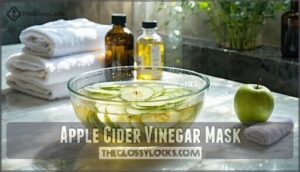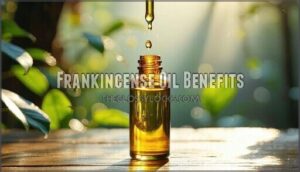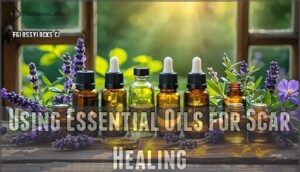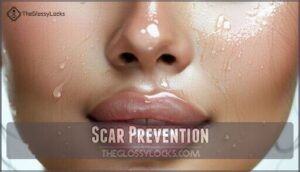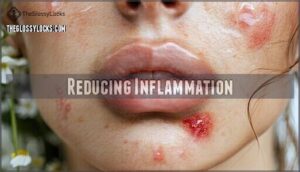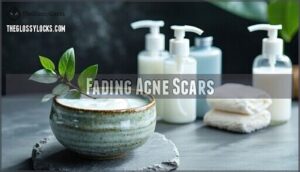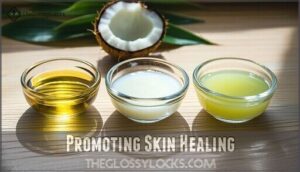This site is supported by our readers. We may earn a commission, at no cost to you, if you purchase through links.
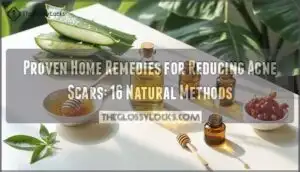
Aloe vera’s anti-inflammatory properties soothe damaged tissue while promoting healing.
Rosehip oil contains vitamin C and essential fatty acids that fade discoloration and improve skin texture.
Raw honey acts as a natural humectant, helping wounds heal faster and preventing future scarring.
Tea tree oil‘s antimicrobial effects reduce inflammation, while apple cider vinegar gently exfoliates dead skin cells.
Green tea extract provides antioxidants that repair damaged skin.
These remedies work best with consistent application over several weeks.
Your skin’s unique chemistry determines which treatments deliver the most dramatic results.
Table Of Contents
- Key Takeaways
- Acne Scar Formation
- Natural Remedies
- Home Treatments
- Essential Oil Therapy
- Scar Prevention
- Reducing Inflammation
- Fading Acne Scars
- Promoting Skin Healing
- Maintaining Healthy Skin
- Frequently Asked Questions (FAQs)
- How do I get rid of acne scars fast at home?
- What helps fade away acne scars?
- Can you 100% remove acne scars?
- Can turmeric clear acne scars?
- How do I get rid of acne scarring?
- Are there natural remedies for acne scars?
- Can home remedies remove scars?
- How to prevent acne scars?
- How can I get rid of acne scars naturally?
- What gets rid of acne scars fast?
- Conclusion
Key Takeaways
- You’ll get the best results with consistent daily application – aloe vera, rosehip oil, honey, and tea tree oil work gradually over several weeks, not overnight
- Choose remedies based on your scar type – atrophic (depressed) scars respond well to vitamin C-rich treatments like rosehip oil, while raised scars benefit from anti-inflammatory options like aloe vera
- Prevention beats treatment every time – proper cleansing with lukewarm water, daily moisturizing, and consistent sunscreen use prevent new scars from forming
- You can’t completely erase scars at home, but you can fade them significantly – natural remedies reduce inflammation, improve texture, and lighten discoloration by up to 80% with patience and persistence
Acne Scar Formation
Acne scars form when inflammation from severe breakouts damages your skin’s collagen structure, leaving behind permanent textural changes.
Understanding the three main scar types—atrophic (depressed), hypertrophic (raised), and keloid (extended beyond original wound)—helps you choose the most effective home remedies for your specific scarring pattern, which is crucial for addressing atrophic scars.
Causes of Acne Scars
When inflammation runs deep during severe acne breakouts, your skin’s healing process can go haywire.
Deep inflammation during breakouts can hijack your skin’s natural repair process, leading to permanent scarring.
Genetic predisposition plays a vital role – some people’s skin simply produces too much or too little collagen during repair. The acne type matters too; cystic lesions cause more damage than surface pimples.
Delayed treatment allows inflammation severity to worsen, disrupting normal skin regeneration and leading to permanent skin discoloration and scarring.
Understanding your skin type is essential for effective skincare routines, which can help prevent permanent damage and promote effective healing.
Types of Acne Scars
Understanding your acne scars helps you choose the right treatment approach.
Atrophic scars appear as depressions in your skin, making up 80-90% of all acne scars.
You’ll recognize three types: ice pick scars (narrow, deep pits), boxcar scars (wide depressions), and rolling scars (wavy indentations).
Hypertrophic scars rise above skin level due to excess collagen, while keloid scars extend beyond the original wound.
PIH creates dark spots, while PIE causes redness—both differ from true scar tissue formation.
These atrophic scars are caused by significant collagen loss in the skin.
Factors Affecting Scar Formation
Your skin’s healing journey isn’t just about the injury itself—several factors stack up like dominoes to determine whether you’ll develop lasting scars.
Your skin’s destiny depends on more than just the breakout—it’s written in your genes, age, and healing habits.
Think of your skin as a construction site where multiple variables affect the final outcome.
Key factors that influence scar formation include:
- Age Influence and Gender Impact: Younger skin produces more collagen during wound healing, while hormonal differences between genders affect skin inflammation responses
- Wound Infection and Oxygen Levels: Poor circulation reduces oxygen delivery to healing tissue, while bacterial infections disrupt normal skin tissue repair processes
- Stress Effects: Chronic stress elevates cortisol levels, slowing collagen production and compromising your skin’s natural healing mechanisms
Understanding these variables helps you take control of your scar healing journey.
Natural Remedies
You’ll find plenty of natural remedies in your kitchen and medicine cabinet that can help fade acne scars without harsh chemicals.
These gentle alternatives work by promoting skin renewal, reducing inflammation, and supporting your skin’s natural healing process.
Aloe Vera Benefits
You’ve discovered nature’s gentle powerhouse for acne scar healing.
Aloe vera’s soothing properties work like a cool drink for thirsty, damaged skin.
This succulent contains compounds that boost collagen production while reducing inflammation and hyperpigmentation.
Regular application can shrink scar tissue naturally, making it perfect for sensitive skin seeking gentle yet effective natural treatments.
| Property | Mechanism | Scar Benefit |
|---|---|---|
| Anti-inflammatory compounds | Reduces skin irritation | Calms red, angry scars |
| Polysaccharides | Stimulates cell regeneration | Promotes skin healing |
| Antioxidants | Protects from free radicals | Prevents further damage |
| Moisturizing agents | Hydrates skin deeply | Improves scar texture |
Rosehip Oil Treatment
Rosehip oil’s unique oil composition delivers powerful acne scar removal benefits through its high concentration of vitamin A and essential fatty acids.
This natural treatment targets multiple scar types effectively when applied consistently. Rosehip oil is also rich in linoleic acid content, which is often deficient in acne-prone skin.
- Application Methods: Massage 2-3 drops onto clean skin twice daily for maximum scar reduction
- Treatment Duration: Continue for 6-12 weeks to see measurable improvements in skin healing
- Complementary Ingredients: Combines well with vitamin C serums for enhanced topical treatments
- Scar Types: Most effective on atrophic and hyperpigmented scars from acne damage
Honey and Cinnamon Mask
While rosehip oil works overnight, honey and cinnamon masks offer immediate soothing effects for acne scar removal.
You’ll mix raw honey with Ceylon cinnamon to create a powerful anti-inflammatory treatment.
This home remedy reduces bacteria while promoting collagen production, making it perfect for sensitive skin types seeking gentle scar reduction.
| Aspect | Honey | Cinnamon |
|---|---|---|
| Best Types | Manuka, raw honey | Ceylon, organic powder |
| Mask Benefits | Antibacterial, moisturizing | Anti-inflammatory, circulation boost |
| Application Frequency | 2-3 times weekly | Mixed with honey only |
| Skin Sensitivity | Generally safe | Patch test required |
| Active Compounds | Natural AHAs, enzymes | Cinnamaldehyde, antioxidants |
Home Treatments
You can enhance your skin’s healing process with powerful home treatments that cost less than expensive procedures.
These proven methods use common household ingredients to fade scars, reduce inflammation, and promote healthy skin regeneration, which can help to enhance the skin’s natural healing abilities with powerful home treatments.
Tea Tree Oil Application
With proper dilution methods, tea tree oil becomes a powerful ally against acne scars.
Start with sensitivity testing—mix one drop with a carrier oil before applying to a small skin patch.
For spot treatment, apply diluted tea tree oil twice daily to affected areas, utilizing its anti-inflammatory properties to help fade post-acne marks through consistent overnight application over several weeks.
Tea tree oil’s antifungal and antibacterial properties can also be beneficial for overall skin health.
Green Tea Extract Benefits
Green tea extract’s polyphenol effects make it a powerhouse for skin scar reduction.
EGCG benefits include reducing inflammation and promoting cellular repair through potent antioxidant properties.
Here are key application methods:
- Brew strong green tea, cool completely, then apply with cotton pads twice daily
- Mix green tea powder with honey to create a healing face mask
- Use green tea-infused skincare products containing concentrated antioxidants for consistent results
Apple Cider Vinegar Mask
Apple cider vinegar works as nature’s toner, killing acne-causing bacteria while gently fading facial scars.
You’ll want proper ACV dilution—mix one part vinegar with three parts water for sensitive skin.
This DIY skincare mask frequency should be twice weekly maximum, as the acidic benefits help remove dead skin cells, though mask ingredients need careful measuring to avoid irritation in your home remedies routine.
Ideal results depend on the ACV concentration levels, ensuring you achieve the best outcomes with proper ACV dilution.
Essential Oil Therapy
Essential oils offer concentrated therapeutic compounds that can accelerate scar healing and improve skin texture through their anti-inflammatory and regenerative properties.
You’ll find that certain oils like frankincense contain powerful compounds that stimulate cellular repair while reducing the appearance of existing acne scars, utilizing their regenerative properties.
Frankincense Oil Benefits
Ancient frankincense oil offers remarkable skin rejuvenation properties through its potent anti-inflammatory action.
This precious essential oil accelerates scar reduction by promoting cellular regeneration and reducing inflammation around facial scars.
For acne scars, dilute frankincense oil with a carrier oil before application. Proper dilution ratios are important for safe use.
Among natural remedies, it provides aromatherapy benefits while healing damaged tissue. Various usage methods include direct application or mixing with moisturizers for maximum home remedies effectiveness.
Using Essential Oils for Scar Healing
Essential oils offer potent scar-healing compounds when properly diluted with carrier oils like jojoba or coconut oil.
Lavender oil stimulates collagen production, while tea tree oil prevents infection in acne scars.
Helichrysum and geranium oils reduce inflammation and encourage new cell growth.
Always patch-test oil blends before application and consider safety concerns regarding sun sensitivity to ensure the safe use of these potent oils.
Scar Prevention
Prevention proves more effective than treatment in the case of acne scars, and the good news is that simple daily habits can dramatically reduce your risk.
By mastering three essential practices—proper cleansing, consistent moisturizing, and diligent sun protection—you’ll create the foundation for clear, healthy skin that heals without leaving permanent marks.
Proper Face Washing Techniques
Proper water temperature matters—lukewarm beats hot or cold for preserving your skin’s natural barrier.
Choose gentle, non-soap cleansers that won’t strip essential oils from acne-prone skin. Washing frequency should stay at twice daily; overdoing it triggers oil overproduction.
Always pat dry instead of rubbing to prevent irritation. Time exfoliation timing carefully, avoiding daily scrubbing that worsens inflammation and delays healing.
A key step is to apply SPF daily to protect from sun damage. This is crucial for maintaining healthy skin, and it should be done in conjunction with other gentle skin care practices.
Moisturizing for Skin Balance
Daily skin moisturization prevents your skin from overcompensating with excess oil production, which can clog pores and worsen scarring.
Choose fragrance-free, non-comedogenic moisturizers that strengthen your skin barrier without triggering breakouts.
For sensitive skin, look for ceramides or hyaluronic acid to boost hydration importance while supporting wound healing and maintaining skin elasticity for ideal barrier function.
Sun Exposure Management
Managing sun exposure becomes vital when healing acne scars, as UV rays can worsen scar pigmentation and create lasting damage.
Photosensitivity risks increase during treatment, making sun protection non-negotiable for ideal results.
Follow these essential sun exposure prevention strategies:
- Apply broad-spectrum sunscreen with desirable SPF levels of 30+ daily
- Seek shade during peak UV hours (10 AM-4 PM)
- Wear protective clothing including wide-brimmed hats and sunglasses
- Reapply sunscreen every two hours for continuous skin protection
Reducing Inflammation
Inflammation is your skin’s natural response to acne damage, but it can worsen scarring if left unchecked.
You’ll want to focus on proven anti-inflammatory ingredients that calm redness and reduce swelling to prevent deeper tissue damage, using methods that promote healing and minimize scarring.
Anti-Inflammatory Remedies
Natural anti-inflammatory home remedies can calm angry, red acne scars without harsh chemicals.
Honey’s antibacterial properties reduce inflammation when applied as topical creams or masks. Aloe vera acts as herbal soothers, decreasing scar tissue size through twice-daily application.
Green tea’s cooling compresses deliver polyphenols that fight swelling. These gentle cleansers support your skin’s healing process naturally, addressing dietary impact through consistent use, utilizing natural ingredients like honey and aloe vera.
Reducing Redness and Swelling
Cold therapy works wonders for calming angry, inflamed acne scars.
You’ll find relief through targeted approaches that address both redness reduction and wound healing without causing additional skin irritation.
Effective redness reduction methods:
- Cooling Compresses – Apply ice wrapped in cloth for 10-15 minutes to reduce inflammation and numb discomfort
- Herbal Remedies – Use chamomile or green tea compresses for their natural antiinflammatory properties
- Gentle Massage – Circular motions with aloe vera gel improve circulation and promote healing
- Diet Choices – Anti-inflammatory foods like berries and fatty fish support your skin’s recovery from within
Your Sleep Position also matters – elevating your head reduces facial swelling overnight.
Fading Acne Scars
After you’ve calmed existing inflammation, it’s time to work on fading those stubborn acne scars that seem to stick around forever.
The good news is that several proven home remedies can help brighten your skin and gradually reduce the appearance of dark spots and textural changes left behind by acne, which is a complete solution to the problem.
Limiting Makeup Application
Heavy makeup can worsen acne scars by trapping bacteria and clogging pores with comedogenic ingredients.
Choose breathable formulas and non-comedogenic products for your skincare routine. Practice proper makeup hygiene by cleaning brushes regularly and replacing old products.
Consider minimalist routines that allow skin to heal naturally. When scar concealing is necessary, opt for lightweight coverage that won’t interfere with your acne treatment progress.
Exfoliation Techniques
Gentle exfoliation helps fade acne scars by removing dead skin cells and promoting cell turnover.
Chemical exfoliation with alpha hydroxy acids or salicylic acid works better than harsh physical scrubs that can worsen scarring. Try enzyme peels from papaya for sensitive skin.
Consider products for exfoliation to enhance your routine. Start with twice-weekly exfoliation frequency, then adjust based on tolerance.
Always follow with post-exfoliation care using moisturizer and sunscreen.
Skin Brightening Remedies
Brightening dark spots from acne scars requires patience and the right natural ingredients.
Vitamin C from lemon juice and tomatoes provides natural lightening properties for hyperpigmentation reduction.
Regular exfoliation with honey removes dead skin cells, revealing brighter skin underneath.
These remedies gradually improve uneven tone and boost radiance, helping achieve more balanced skin tone through consistent spot fading techniques.
Promoting Skin Healing
Your skin’s natural healing process can be substantially enhanced with proven home remedies that promote cellular repair and collagen production.
Three powerhouse ingredients—vitamin E oil, coconut oil, and cucumber juice—offer science-backed benefits for accelerating recovery and reducing scar visibility, which can be considered a powerhouse.
Vitamin E Oil Benefits
Vitamin E oil’s reputation for scar reduction lacks solid scientific backing, though it offers genuine skin benefits.
While studies show mixed results for acne scars, this antioxidant powerhouse still deserves consideration in your skincare routine.
- Antioxidant Effects: Protects skin from free radical damage and environmental stressors
- Skin Hydration: Strengthens moisture barrier and prevents transepidermal water loss
- Wound Healing: May support recovery from minor skin injuries and irritation
- Application Methods: Use pure oil or serums; patch test before widespread topical treatments
Coconut Oil Treatment
Coconut oil works like nature’s repair kit for your skin.
This tropical treasure aids collagen formation while reducing inflammation in healing wounds.
You’ll want to apply virgin coconut oil directly to clean scars twice daily, gently massaging until absorbed.
The oil’s antimicrobial properties prevent infections that worsen scarring.
Coconut oil benefits include deep moisturization and gentle exfoliation, making it suitable for sensitive skin types.
Cucumber Juice Benefits
Fresh cucumber juice offers powerful hydration effects that support your skin’s natural healing process.
You can apply cucumber juice directly to acne scars using a cotton pad, leaving it for fifteen minutes before rinsing.
The anti-inflammatory compounds reduce redness while improving skin texture, this is a gentle home remedy that works best when you use it consistently as part of your daily skin care routine for maximum scar reduction results, which can be achieved with daily application.
Maintaining Healthy Skin
Your skin’s health depends on what you put into your body and how you manage daily stress.
Creating a consistent skincare routine that includes proper nutrition, stress control, and gentle daily care helps prevent new breakouts while supporting your skin’s natural healing process.
Healthy Diet for Skin
Your skin’s healing journey depends on proper nutrition, and what you eat directly impacts how quickly acne scars fade.
A healthy diet rich in specific nutrients can accelerate wound healing and support skin repair from within.
Key nutrients for skin nutrition include:
- Antioxidant Intake – Berries, leafy greens, and colorful vegetables fight free radicals
- Omega-3 Benefits – Fatty fish, walnuts, and flaxseeds reduce inflammation
- Vitamin Rich Foods – Citrus fruits, bell peppers boost collagen production
- Mineral Support – Zinc from pumpkin seeds aids tissue repair
- Hydration Importance – Water flushes toxins, maintains skin elasticity
Stress Management Techniques
Multiple daily stress management techniques substantially reduce inflammation that worsens acne scars.
Mindfulness meditation lowers cortisol levels, while regular exercise benefits circulation and wound healing. Quality sleep hygiene supports skin repair overnight.
Simple stress reduction methods like deep breathing improve emotional wellbeing.
When you’re stressed, your body produces more inflammatory chemicals that interfere with natural healing processes, involving inflammatory chemicals and affecting natural healing.
Consistent Skincare Routine
Beyond the basics of gentle cleansing lies the secret to transforming your skin.
A consistent skincare routine becomes your daily armor against acne scars, combining gentle cleansing with targeted treatments for hyperpigmentation.
Daily hydration keeps skin supple while topical treatments work their magic.
Routine consistency beats sporadic efforts every time—your skin thrives on predictable care, making preventative measures the foundation for lasting results, with daily hydration and consistent skincare routine being key, and preventative measures ensuring long-term success.
Frequently Asked Questions (FAQs)
How do I get rid of acne scars fast at home?
Like a race against time, you can’t truly eliminate acne scars overnight, but retinoids, vitamin C, and gentle exfoliation with AHAs help accelerate healing and fade discoloration within weeks.
What helps fade away acne scars?
You’ll see improvement using retinoids, vitamin C, and alpha hydroxy acids consistently. These proven ingredients boost collagen production, fade discoloration, and smooth texture when applied daily with sunscreen protection.
Can you 100% remove acne scars?
Complete scar removal isn’t realistic—think of scars as permanent tattoos on your skin.
However, you can substantially fade them with consistent treatments like retinoids, chemical peels, and laser therapy, achieving up to 80% improvement over time.
Can turmeric clear acne scars?
Turmeric can help reduce acne scars through its anti-inflammatory properties, but it won’t completely eliminate them.
You’ll see gradual improvement with consistent use, especially when combined with other treatments for better results.
How do I get rid of acne scarring?
Conquering acne scars isn’t impossible.
You’ll need consistent treatments like retinoids, vitamin C, chemical peels, microneedling, or laser therapy.
Professional dermatological procedures work fastest, while topical treatments require patience for results.
Are there natural remedies for acne scars?
You’ll find aloe vera, rosehip oil, and honey work naturally to fade acne scars.
These gentle remedies reduce inflammation, promote healing, and improve skin texture through consistent daily application over several months.
Can home remedies remove scars?
While home remedies can be your skin’s best friend, they won’t completely erase scars—they’ll fade and soften them over time.
Aloe vera, honey, and rosehip oil show promise in clinical studies for improving scar appearance through consistent daily use, with aloe vera being a key component.
How to prevent acne scars?
Don’t pick at breakouts or squeeze pimples—this damages skin tissue and increases scarring risk.
Treat acne early with gentle cleansers, avoid harsh scrubbing, and use sunscreen daily to protect healing skin.
How can I get rid of acne scars naturally?
Try rosehip oil, aloe vera gel, or honey daily on clean skin. These natural ingredients contain vitamins and compounds that help fade scars over time with consistent use.
What gets rid of acne scars fast?
Like watching paint dry, acne scars don’t vanish overnight, but professional treatments work fastest.
Chemical peels, microneedling, and laser therapy deliver visible results within weeks to months, while topical retinoids accelerate healing substantially.
Conclusion
Transforming stubborn acne scars doesn’t require expensive procedures when you have nature’s pharmacy at your fingertips.
These proven home remedies for reducing acne scars offer real solutions backed by science and centuries of traditional use.
Remember, consistency beats perfection every time, and your dedication to daily application determines success more than choosing the "perfect" remedy.
Start with one treatment, monitor your skin’s response, and gradually expand your routine, which will help you discover which natural methods work best for your unique skin chemistry and scarring patterns with patience and persistence.
You’ll find that nature’s pharmacy and a well-planned routine are key to reducing acne scars, and by following these steps, you can achieve the desired results, keeping in mind that daily application is crucial.
- https://www.bostondermadvocate.com/science-of-skincare/home-treatments-acne-scars
- https://pmc.ncbi.nlm.nih.gov/articles/PMC9147527/
- https://otcoclinic.com/blog/scars-after-acne-home-treatments/
- https://www.healthline.com/health/aloe-vera-for-acne-scars
- https://www.dermaartsclinic.com/blog/tips-for-acne-scars-removal-naturally-in-a-week/




